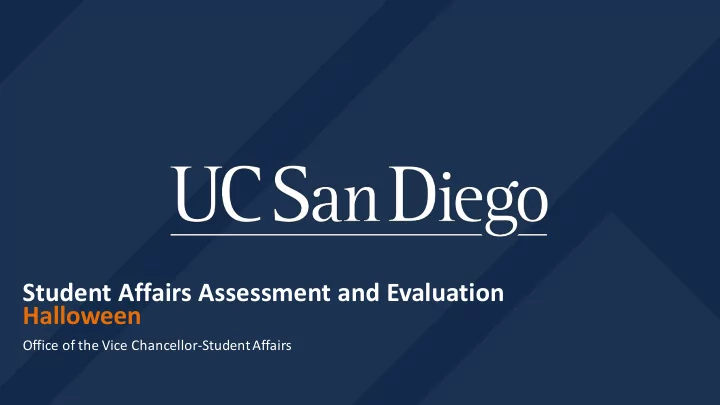

Student Affairs Assessment and Evaluation Halloween Office of the Vice Chancellor-StudentAffairs
Assessment and You
An iterative process involving: • • “Systematic collection of information about student learning” • Capitalizing on available resources: personnel, time, etc • Most importantly: to drive decision-making about program effectiveness toward meeting set targets • Especially involving student learning! Walvoord, B. (2010). Assessment Clear and Simple. Jossey Bass: USA, p. • 2.
Forbes Magazine “Top Issues Facing Higher Education in 2014” • • Renewal of the Higher Education Act • Workforce preparation • Accreditation Who decides? • http://www.forbes.com/sites/johnebersole/2014/01/13/top-issues-facing- higher-education-in-2014/
Course/Activity Level: Unit of analysis is Individual Student Learning Provides support for Program/Office Level: Unit of analysis is Program- Wide Student Learning Granularity Department/Unit Level: Unit of analysis is learning of all students within the department or unit College/Division Level: Unit of analysis is learning of all students within the college or division Institutional Level: Unit of analysis is learning of all UCSD students
Student learning happens everywhere, not just in the classroom • • Learning Reconsidered • National Survey of Student Engagement (NSSE) • Kuh’s High-Impact Practices Demonstrate that (and how) learning occurs • Collaborate to provide richer evidence •
UCSD Student Affairs Assessment Policy In conducting assessment, we as a Student Affairs unit: • Are committed to assessment for, but not limited by, learning • Believe in assessment as an engaged practice, working towards a continuous improvement • View assessment as a reflective practice, where we step back from day to day in order to engage the deeper meaning of our work • Promote assessment as transparent practice, where we eagerly share findings with the community and hold ourselves accountable for our actions
The Assessment Cycle
Assessment as an Inquiry Process Asking questions Communicating what Collecting evidence you’ve learned Reflection/Suggesting Action explanations based on the evidence Evaluating explanations; forming conclusions
Assessment and Evaluation Assessment Evaluation Focus Student learning Program/service performance or impact Time Span Shorter (usually within a Variable (but tends to be longer) year) Scope Usually more focused on a Usually broader, encompassing specific aspect (ex. a many aspects (ex. learning, but also learning outcome) satisfaction and utilization) Timing As program is ongoing Toward more of an end point Resources Typically can be conducted Typically requires accessing data Needed within the program from elsewhere on campus Why are course grades an example of evaluation?
Learning Outcomes vs. Operational Outcomes Student Learning Outcomes Operational Outcomes Derived from mission and purpose Derived from description of the work of department Measures contributions to student learning Measure performance of the work (did (was the experience transformative?) students complete a task?) Achievement = Effectiveness Achievement = Productivity, Satisfaction or Accomplishment Require criteria to define levels of Require criteria to define levels of effectiveness performance Individual and collective feedback to shape Individual feedback to shape department department programs and services systems Assessment: how effective were we? Assessment: how well did we perform our tasks? Is the train headed in the right direction? Is the train on time? Are students learning something? Are students satisfied with our programs and services?
What’s Coming Up? • Capacity-building (begin with learning community in 2019-2020, extend into formal programming) • Assessment plans for 2020-2021 (starting Fall 2019) • Meetings with individual units to review assessment efforts and begin creation of assessment plans (starting Fall 2019) • Accreditation (November 2019) • Alignment of metrics for SA strategic plan/review of learning domains (begin December 2019) • Formalized evaluation process, including identification of divisional priorities (in progress) • Data access/training (?) • Program review (2020-2021)
2019-2020: The Year of Accreditation •Site visit will be November 20 th -22 nd , 2019 Commons.Wikimedia.org
Questions? Concerns? Hopes and dreams?
Recommend
More recommend